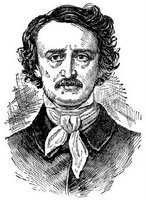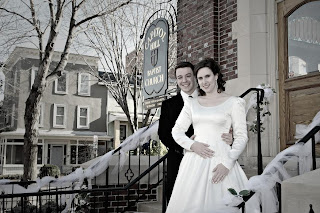On this day in literature . . .
 ~ 1809 ~ Edgar Allan Poe is born in Boston.
~ 1809 ~ Edgar Allan Poe is born in Boston. My first experience with Edgar Allan Poe was a movie version of "Murders in the Rue Morgue." I think I was about 7. My sisters and I had planned to sleep outside on the deck that night with my dad, thinking it would be a fun adventure. (The Ruffner girls have never been all that into camping, so, believe me, the deck was going to be adventure enough.) Unfortunately, though, we watched this movie first. It's about a series of murders that turn out to have been committed by some crazed orangutan. Not exactly the sort of comforting movie that inspires you to sleep outside. Needless to say, we never did make it out to the deck that night, all thanks to Edgar Allan Poe and his great ability to terrify!
Edgar Allan Poe was a strong influence on the American short story. He decried what he called "epic mania," the thought that, since America was a large, grand, sweeping country, our literature ought to be large, grand, and sweeping. Instead, he believed that a work of literature ought to be able to be read in one sitting and that it ought to achieve one "effect." In many of his short stories, that effect is horror, while in his poems it is tragedy and sadness. Poe is known for stories such as "The Fall of the House of Usher," "The Masque of the Red Death," and "The Tell-Tale Heart," as well as for his poems "Annabel Lee" and "The Raven." Poe's work often focuses on the death of a beautiful woman, testifying to several tragic losses in his personal life. Along with other short story writers during the Romantic period such as Nathaniel Hawthorne and Washington Irving, Edgar Allan Poe is responsible for raising the American short story to a position of respectability and art.


0 Comments:
Post a Comment
<< Home